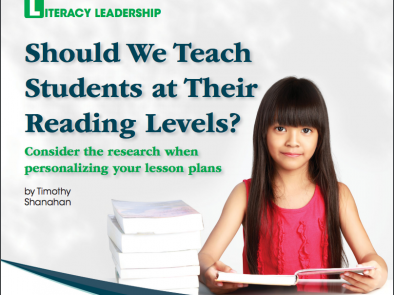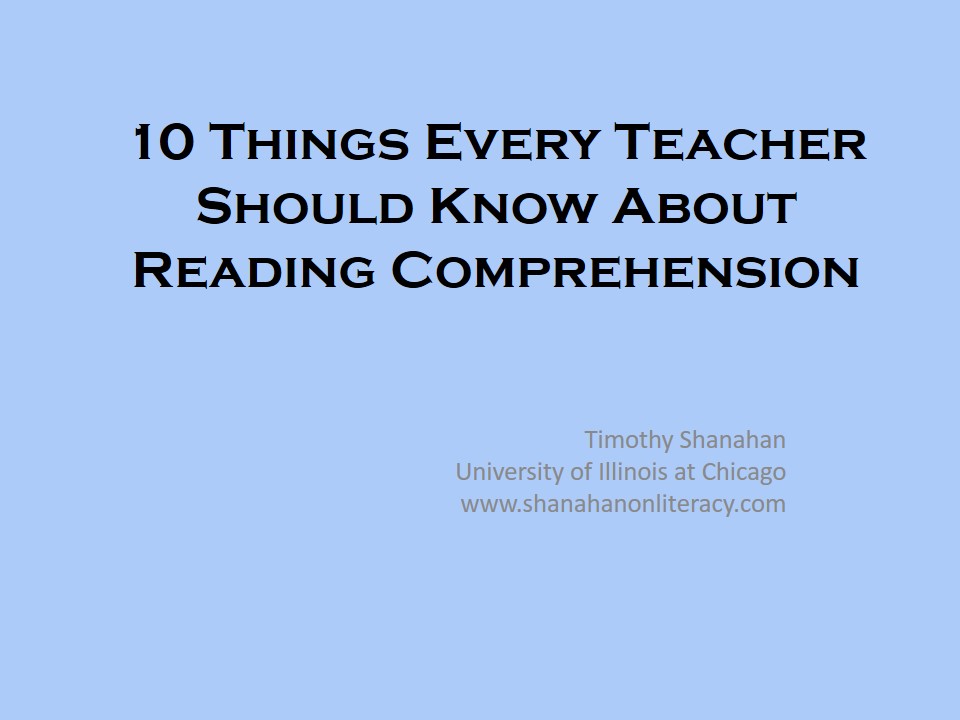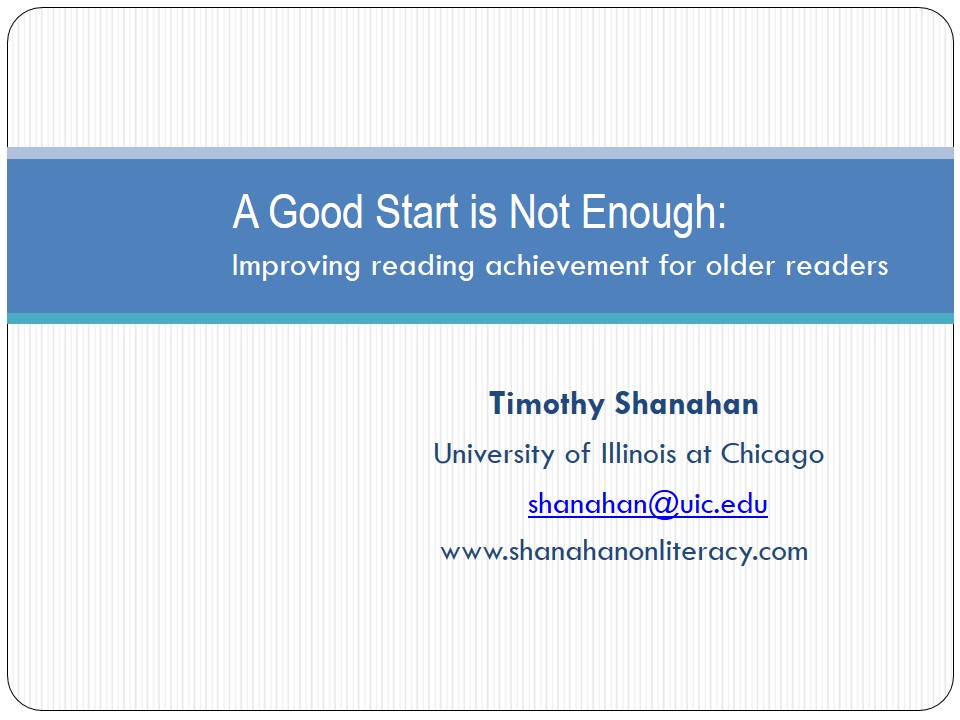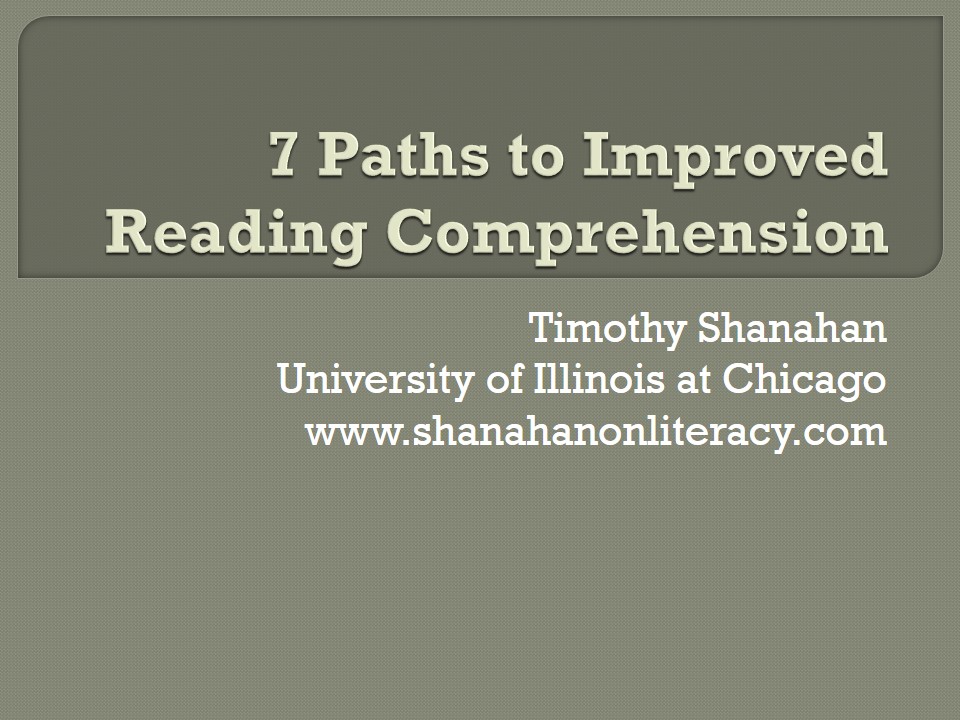Should We Teach Students at their Reading Levels?

Should We Teach Students at their Reading Levels?
Timothy Shanahan
"Shanahan, recipient of the 2013 William S. Gray Citation of Merit for outstanding contributions to the field of reading, gave the annual research address at the IRA 2014 Conference in New Orleans. The following is a summary of his speech, serving as a reminder of the key points to keep in mind in today’s classroom."
Scaffolded Oral Reading Research (noted in this article)
Bonfiglio, C. M., Daly, E. J., Persampieri, M., & Andersen, M. (2006). An experimental analysis of the effects of reading interventions in a small group reading instruction context. Journal of Behavioral Education, 15, 93-109.
Burns, M. K. (2007). Reading at the instructional level with children identified as learning disabled: Potential implications for Response-to-Intervention. School Psychology Quarterly, 22, 297-313.
Burns, M. K., Dean, V. J., & Foley, S. (2004). Preteaching unknown key words with incremental rehearsal to improve reading fluency and comprehension with children identified as reading disabled. Journal of School Psychology, 42, 303–314.
Carney, J. J., Anderson, D., Blackburn, C., & Blessing, D. (1984). Preteaching vocabulary and the comprehension of social studies materials by elementary school children. Social Education, 48(3), 195-196.
Daly, E., & Martens, B. (1994). A comparison of three interventions for increasing oral reading performance: Application of the instructional hierarchy. Journal of Applied Behavior Analysis, 27, 459-469.
Eckert, T. L., Ardoin, S. P., Daisey, D. M., & Scarola, M. D. (2000). Empirically evaluating the effectiveness of reading interventions: The use of brief experimental analysis and single-case designs. Psychology in the Schools, 37, 463-474.
Carney, J. J., Anderson, D., Blackburn, C., & Blessing, D. (1984). Preteaching vocabulary and the comprehension of social studies materials by elementary school children. Social Education, 48(3), 195-196.
Gickling, E. E., & Armstrong, D. L. (1978). Levels of instructional difficulty as related to on-task behavior, task completion, and comprehension. Journal of Learning Disabilities, 11, 559-566.
Hall, K. M., Sabey, B. L., & McClellan, M. (2005). Expository text comprehension: Helping primary-grade teachers use expository texts to full advantage. Reading Psychology, 26, 211-234.
Levy, B. A., Nicholls, A., & Kohen, D. (1993). Repeated readings: Process benefits for good and poor readers. Journal of Experimental Child Psychology, 56, 303-327.
McComas, J. J., Wacker, D. P. & Cooper, L. J. (1996). Experimental analysis of academic performance in an academic setting. Journal of Behavioral Education, 6, 191-201.
Neill, K. (1979). Turn kids on with repeated reading. Teaching Exceptional Children, 12, 63-64.
O’Shea, L. J., Sindelar, P. T., & O’Shea, D. J. (1987). The effects of repeated readings and attentional cues on the reading fluency and comprehension of learning disabled readers. Learning Disabilities Research, 2, 103 – 109.
VanWagenen, M. A., Williams, R. L., & McLaughlin, T. F. (1994). Use of assisted reading to improve reading rate, word accuracy, and comprehension with ESL Spanish-speaking students. Perceptual and Motor Skills, 79, 227-230.
Rasinski, T. V. (1990). Effects of repeated reading and listening-while-reading on reading fluency. Journal of Educational Research, 83, 147-150.
Reitsma, P. (1988). Reading practice for beginners: Effects of guided reading, reading-while-listening, and independent reading with computer-based speech feedback. Reading Research Quarterly, 23, 219-235.
Rose, T., & Beattie, J. (1986). Relative effects of teacher-directed and taped previewing on oral reading. Learning Disability Quarterly, 9, 139 – 199.
Sanford, A. K., & Horner, R. H. (2013). Effects of matching instruction difficulty to students with escape-maintained problem behavior. Journal of Positive Behavior Interventions, 15, 79-89.
Sindelar, P. T., Monda, L. E., & O’Shea, L. J. (1990). Effects of repeated readings on instructional- and mastery-level readers. Journal of Educational Research, 83, 220-226.
Stoddard, K., Valcante, G., Sindelar, P., O’Shea, L., & Algozzine, B. (1993). Increasing reading rate and comprehension: The effects of repeated readings, sentence segmentation, and intonation training. Reading Research and Instruction, 32, 53-65.
Reitsma, P. (1988). Reading practice for beginners: Effects of guided reading, reading-while-listening, and independent reading with computer-based speech feedback. Reading Research Quarterly, 23, 219-235.
Stoddard, K., Valcante, G., Sindelar, P., O’Shea, L., & Algozzine, B. (1993). Increasing reading rate and comprehension: The effects of repeated readings, sentence segmentation, and intonation training. Reading Research and Instruction, 32, 53-65.
VanWagenen, M. A., Williams, R. L., & McLaughlin, T. F. (1994). Use of assisted reading to improve reading rate, word accuracy, and comprehension with ESL Spanish-speaking students. Perceptual and Motor Skills, 79, 227-230.
Weinstein, G., & Cooke, N. L. (1992). The effects of two repeated reading interventions on generalization of fluency. Learning Disability Quarterly, 15, 21–28.


